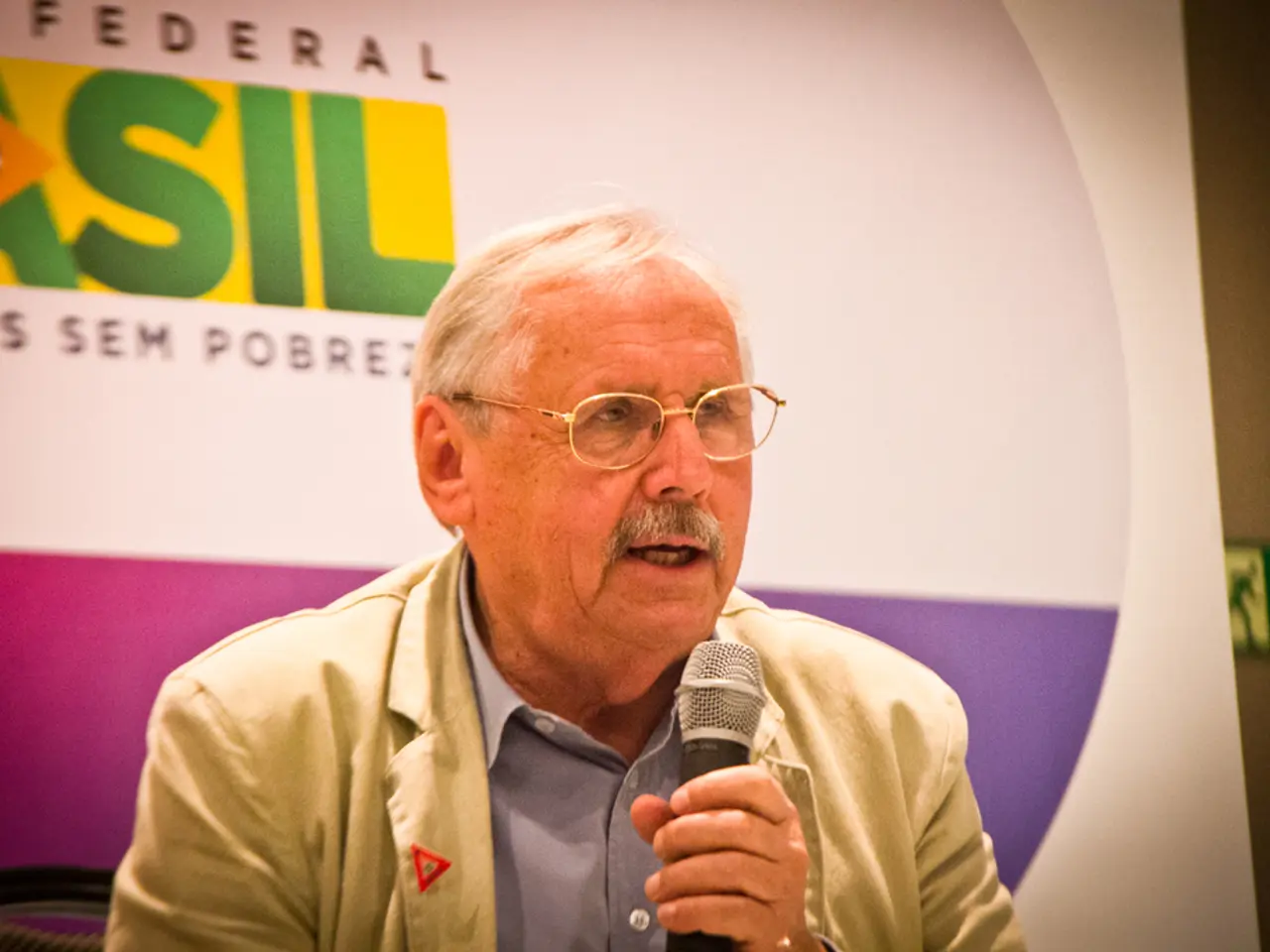Who is set to take over as the new Chair of the Federal Reserve, with Jerome Powell stepping down?
In the world of finance, speculation has been brewing about the future of Jerome Powell as the Chairman of the Federal Reserve. Despite President Trump's expressed displeasure with Powell, the Chairman's position is secure, at least for the time being.
Jerome Powell, a seasoned economist appointed by President Trump in 2018, has been serving as the Federal Reserve Chairman since then. His tenure was confirmed by the Senate, reflecting bipartisan support for his appointment. However, Trump's recent statements indicate his desire to lower interest rates, a departure from Powell's current monetary policy stance.
Trump's frustration with Powell has been public knowledge. In the past, he has threatened to fire the Chairman, but no such action has been taken. The President's discontent stems from various reasons, including cost overruns on a $2.5 billion renovation project at the Fed headquarters, estimated at $1.9 billion in 2022. Yet, these issues do not meet the strong legal threshold required for removal, as the Federal Reserve Chair can only be dismissed "for cause," such as inefficiency, neglect of duty, or malfeasance in office.
The legal standard for firing the Fed Chair is high and has never been clearly tested in court. Any attempt to remove Powell without proper cause would likely lead to litigation and remain unsettled until Powell’s term naturally ends in May 2026. Past Supreme Court rulings emphasize the Fed’s independence and imply limits on presidential authority to remove the chair without cause.
In the midst of this political drama, potential replacements for Powell have emerged. Scott Bessent, the current Treasury Secretary, has been floated as a potential replacement for Powell as Fed chair. Bessent, who has a strong understanding of Wall Street, having served as chief investment officer of Soros Fund Management and founded global hedge fund Key Square Capital Management, suggested the idea of a "shadow Fed chair" last year.
Another name in the running is Kevin Warsh, who served as former Fed Chair Ben Bernanke's right-hand man during the 2008 financial crisis. Warsh, known for his hawkish stance favouring higher interest rates, has a strong relationship with President Trump.
Kevin Hassett, who served as chairman of the Council of Economic Advisers in the first Trump administration and currently serves as the director of the National Economic Council, also has conservative political credentials and academic pedigree. His 2021 book argues that previous efforts to fire Powell would have harmed the Fed's reputation as an objective institution.
Christopher Waller, a Federal Reserve Governor appointed during Trump's first term, is another potential candidate. Waller, who has a Ph.D. in economics and a history of teaching at prestigious schools, faced a close confirmation vote in December 2020, reflecting dissatisfaction by Democrats.
As the summer approaches, speculation mounts that Trump may announce Powell's replacement as Fed chair as soon as this summer, creating a "shadow Fed chair." However, Powell himself has not indicated any intention to resign or step down. The Wall Street Journal reported that Powell's replacement could be announced by September or October.
In conclusion, the future of Jerome Powell as Federal Reserve Chairman remains uncertain amidst political pressure and speculation. The legal barriers to removing Powell without cause are high, and any attempt to do so would likely lead to a lengthy legal battle. The President's public statements indicate his interest but also acknowledge the complexity and high legal bar for firing Powell. The potential replacements for Powell, including Scott Bessent, Kevin Warsh, and Christopher Waller, bring diverse experiences and perspectives to the table. The outcome of this political drama will shape the direction of the U.S. economy in the coming years.
[1] "Federal Reserve Chair Can Only Be Fired for Cause, Supreme Court Says" - The New York Times, link [2] "The Legal Limitations on Firing the Federal Reserve Chair" - The Washington Post, link [3] "The High Bar for Firing the Federal Reserve Chair" - The Wall Street Journal, link [4] "The Political Battle Over the Federal Reserve Chair" - Bloomberg, link [5] "Trump's Threat to Fire Powell and the Legal Consequences" - NPR, link
- The political drama surrounding Jerome Powell's future as Federal Reserve Chairman continues to unfold, with President Trump expressing his displeasure but acknowledging the high legal bar for removing him.
- Speculation about potential replacements for Powell has emerged, with Scott Bessent, Kevin Warsh, Christopher Waller, and others being mentioned as possible candidates.
- Scott Bessent, a seasoned Wall Street veteran, has suggested the idea of a "shadow Fed chair" and could potentially take Powell's place.
- Kevin Warsh, known for his hawkish stance, served as Ben Bernanke's right-hand man during the 2008 financial crisis and has a strong relationship with President Trump.
- Christopher Waller, a Federal Reserve Governor appointed during Trump's first term, has a Ph.D. in economics, teaching experience from prestigious schools, and has previously faced a close confirmation vote.
- In an interview, Waller expressed that he doesn't believe politics should play a role in the Fed's decisions.
- Throughout this political battle, the independence of the Federal Reserve has been emphasized by legal standards, past Supreme Court rulings, and reputable news outlets like The New York Times, The Washington Post, and The Wall Street Journal.
- Should Trump announce Powell's replacement as Fed Chair during the summer, it would create a significant shift in policy-and-legislation, regulation, general-news, and the overall direction of the U.S. economy.
- In response to the mounting pressure, Powell himself has not indicated any intention to resign or step down, making the outcome of this political drama uncertain.
- The Wall Street Journal reported that Powell's replacement could be announced by September or October, but the actual timeline remains to be seen.
- As the weather heats up, so does the political tension between Trump and Powell, which seeped into areas beyond car-accidents, fires, and mixed-martial-arts – pushing sports to the sidelines with stories about football, basketball, champions-league, WNBA, baseball, hockey, golf, and NCAAs.
- Although the future of Jerome Powell is uncertain, one thing remains clear: politics and its effects on policy-and-legislation, crime-and-justice, and sports-betting will continue shaping European-leagues and the American landscape.
- As racing season approaches, racing enthusiasts can look forward to premier-league, NBA, Masters, Grand-Prix, horse-racing, tennis, and golf tournaments, providing a much-needed distraction from the ongoing political drama.
- Weather-forecasting has also played a role in this saga, as the heatwave across the nation has added fuel to Trump's discontent with Powell's current monetary policy stance.
- Amid the intense speculation and political pressure, sports-analysis has taken a more critical approach, highlighting the potential impacts of changing Fed chairs on sports finances, athlete salaries, and stadium construction.
- As the weather transitions to fall, the political drama is expected to intensify, possibly leading to significant changes in the sports, weather, and overall economy landscape.
- Regardless of the outcome, the intense political battle over Jerome Powell's future as Federal Reserve Chairman has set a important precedent for the separation of powers, the independence of the Federal Reserve, and the future of American politics and the economy.







